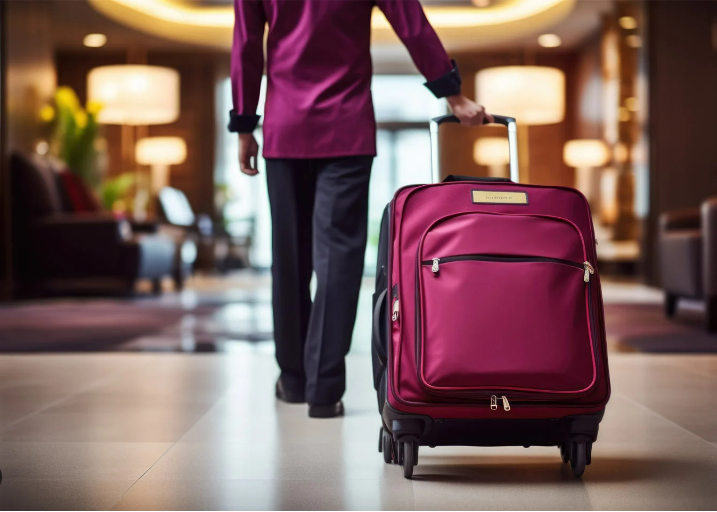A Guide to Maximize Rewards When Traveling for an Employer


Traveling for work can be both exhilarating and draining. However, one of the perks is the chance to accumulate travel rewards from airlines, hotels, and credit card issuers while your employer covers the costs. Maximizing these rewards requires some skill and know-how, but with the right approach, you can make the most of your business trips.
How to maximize rewards through work travel
First, it’s important to remember that employers are not legally required to give you the rewards earned from business travel. While some companies generously pass on these rewards to employees as a token of appreciation for the demands of business travel, others may retain them to offset future travel expenses. To understand how your company handles travel reimbursements and rewards, check your employee handbook or consult your HR or corporate travel teams.
If you are able to personally earn business travel rewards, you might encounter these common scenarios:
- Using a Personal Credit Card: You pay for work travel using your personal credit card and then request reimbursement from your employer.
- Using a Business Credit Card: You use a company-issued credit card to book your business travel.
- Booking Through a Central Portal: Your travel is booked through a central travel portal such as SAP Concur, Navan, or Egencia, either by you or a member of the corporate travel team.
In the second and third scenarios, where travel is booked on a corporate card or through a central portal, your HR or corporate travel team can assist in attaching your loyalty program number to your reservations, when applicable. However, if you’re booking travel on your own and seeking reimbursement, here are some tips to maximize your rewards and enjoy other loyalty benefits while traveling for work.
Earn extra rewards from airline and hotel loyalty programs
Earning rewards from business travel starts with joining the loyalty programs offered by airlines and hotels. Enroll in top airline frequent flyer programs and hotel loyalty programs, and make sure to include your loyalty account number with every reservation.
Beyond accumulating points from your regular work flights and stays, these programs often run promotions that can boost your rewards. For example, you might earn double points for staying at a specific hotel chain or receive extra miles for purchases at selected retailers and restaurants if you link your loyalty accounts. Opting in to receive promotional emails from these programs can help you stay informed about opportunities to earn additional rewards.
Earn and enjoy the benefits of elite status
Once you begin participating in these programs, it’s beneficial to familiarize yourself with their details. Many programs offer elite status, which can increase your rewards and provide additional benefits. Here are some examples of potential perks you could enjoy with elite status:
Potential Airline Perks:
- Priority boarding
- Fee waivers
- Upgrades to first class
Potential Hotel Perks:
- Priority service
- Complimentary breakfast
- Room upgrades
Enroll in loyalty programs from other businesses
It’s also wise to explore loyalty programs from other companies you use while traveling for business, such as rental car programs, rideshare services, airport parking providers, and even your favorite restaurant chains. Online travel agencies often have their own loyalty programs as well.
Linking your everyday loyalty accounts with your hotel or airline loyalty accounts can help you earn additional points and miles on your business travel purchases. You may also qualify for discounts at certain retailers.
Joining a rental car loyalty program can be particularly advantageous for business travelers. These programs often provide priority service, vehicle upgrades, and credit towards free rentals. Some programs even offer a free rental day if you rent twice within a specific month.
Using personal credit cards for work travel

To maximize the points earned from your business expenses, it’s crucial to use the right credit cards. This begins with deciding between general travel rewards cards and those associated with specific co-branded partners.
Using personal credit cards for work travel
A common type of travel rewards card is one issued by card providers not affiliated with specific travel brands. For instance, the Chase Sapphire Preferred® Card offers 3X points on dining and 2X points on various travel expenses, such as airfare, hotels, rental cars, and even parking and tolls. Using such a card for business travel expenses can help you accumulate points rapidly.
These points are earned through the Chase Ultimate Rewards program, which allows you to redeem them for travel bookings with numerous hotels and airlines via their travel portal. Alternatively, you can transfer these rewards to airline miles or hotel points with various travel partners. Other redemption options include merchandise, gift cards, and cash back.
Other issuers offer similar non-co-branded travel rewards programs, including:
- American Express Membership Rewards
- Capital One miles
- Chase Ultimate Rewards
- Citi ThankYou points
Using co-branded travel rewards cards
Instead of using credit cards that offer rewards through general bank-sponsored programs, you might opt for cards co-branded with airlines or hotels. These co-branded cards reward you with airline miles or hotel points directly.
Such cards often provide bonus rewards for purchases made with the affiliated airline or hotel, as well as for other travel and dining expenses. Additionally, they come with travel-related perks. For instance, most airline co-branded cards offer benefits like a free checked bag and a quicker path to elite status. Similarly, many hotel co-branded cards provide basic elite status and the chance to earn more credits toward higher status levels.
Using cash back cards
Some business travelers prefer earning cash back from their credit cards rather than travel rewards. For instance, if they accumulate sufficient points and miles through their hotel and airline loyalty programs for their personal travel, they might choose to earn cash back instead to supplement their income.
Currently, the most competitive cash back cards offer up to 2% cash back on all purchases. Additionally, some cards provide substantial bonuses for specific categories such as dining and travel.
Should you book work travel on a personal credit card?
The main benefit of using your personal credit card for business travel is the opportunity to earn more credit card rewards. However, this approach requires you to spend time completing expense reports and can lead to a delay in receiving reimbursement from your employer. Additionally, if you carry a balance, you may incur interest charges on these expenses that won’t be reimbursed.
Using a business credit card or booking through your company’s travel portal can simplify expense reporting and reduce risks. Most airlines allow you to apply your frequent flyer number to reservations made through a travel agency, but many hotels only offer loyalty rewards and benefits if you book directly with the hotel chain.
Thus, while booking through an employer’s travel portal can ease administrative tasks and minimize financial risk, charging business travel to your personal credit card is generally the best way to maximize rewards.
In Conclusion
With the points and miles offered by both credit card issuers and travel providers, there are numerous opportunities to maximize rewards from your business travel. By familiarizing yourself with all the ways to earn points, miles, or cash back, you can ensure that you receive the most valuable rewards whenever you travel for work.








